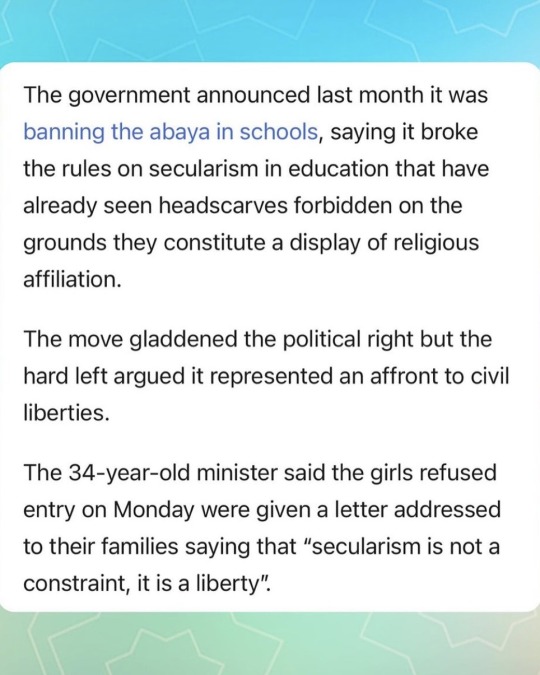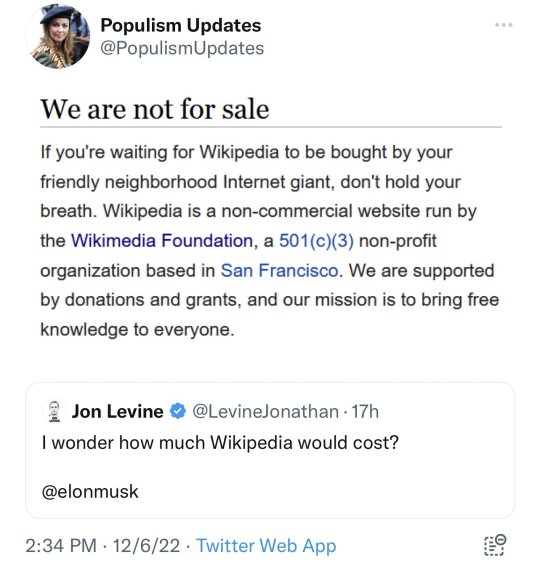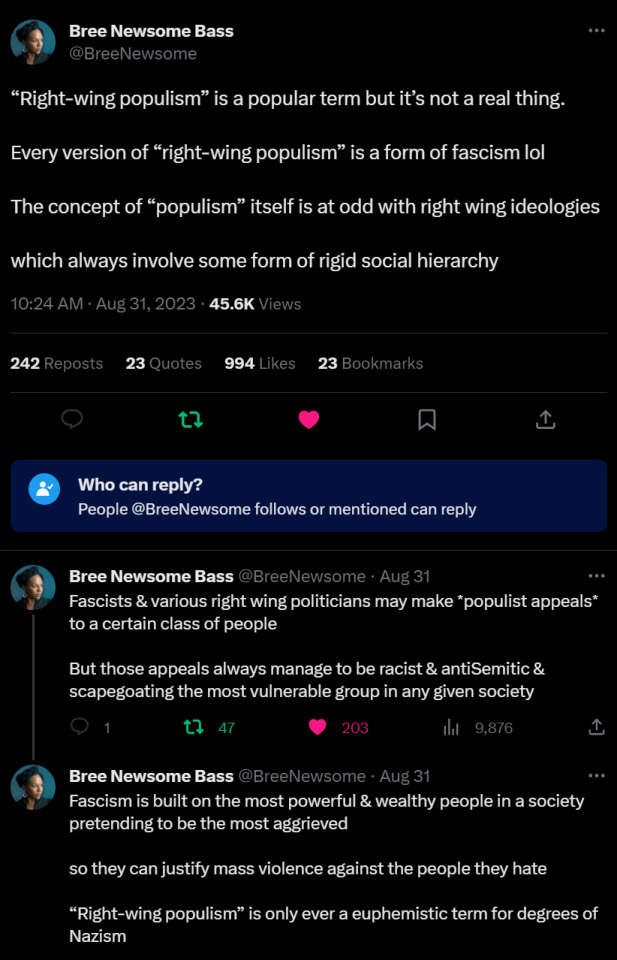#populism
Text
The resurgence of reactionary politics is entirely predictable and has been traced for a long time. Yet every victory or rise is analysed as new and unexpected rather than part of a longer, wider process in which we are all implicated.
The same goes for “populism”. All serious research on the matter points to the populist nature of these parties being secondary at best, compared to their far-right qualities. Yet, whether in the media or academia, populism is generally used carelessly as a key defining feature.
Using “populist” instead of more accurate but also stigmatising terms such as “far-right” or “racist” acts as a key legitimiser of far-right politics. It lends these parties and politicians a veneer of democratic support through the etymological link to the people and erases their deeply elitist nature – what my co-author Aaron Winter and I have termed “reactionary democracy”.
What this points to is that the processes of mainstreaming and normalisation of far-right politics have much to do with the mainstream itself, if not more than with the far right. Indeed, there can be no mainstreaming without the mainstream accepting such ideas in its fold.
In this case, the mainstreaming process has involved platforming, hyping and legitimising far-right ideas while seemingly opposing them and denying responsibility in the process.
296 notes
·
View notes
Text
Actually, the President of the United States is powerful

US Presidents have lots of things they can do beyond signing or vetoing legislation. Their administrative agencies have broad powers that allow them to act without dragging Congress behind them.
For example, Jennifer Abruzzo, the ass-kicking superhero that Biden appointed as National Labor Relations Board General Counsel, has used her powers to establish a rule that companies that break labor law during union drives automatically lose, with the affected union gaining instant recognition.
For a followup, Abruzzo is using a case called Thrive Pet Care to impose a “duty to bargain” on companies. If a company won’t bargain in good faith for a union contract, Abruzzo’s NLRB will simply force them to adhere to the contractual terms established by rival companies that did bargain with their unions, until such time as a contract is signed.
But wait, what about the dastardly Supreme Court? What if those six dotards in robes use their stolen seats on the country’s highest court to block Biden’s administrators?
Well, Biden could do what his predecessors have done. Like Lincoln, Biden could simply ignore the court, embracing popular policies he was elected to enact, revealing the Supremes to be toothless, out-of-touch, undemocratic and illegitimate.
(Andrew Jackson was a monster, but when he ignored his own Supreme Court, he proved that the Supremes’ only leverage came from their legitimacy; recall the (likely apocryphal) quote, “[Chief Justice] John Marshall has made his decision; now let him enforce it!”)
Like FDR, Biden could threaten to pack the court, creating a national debate about the court’s illegitimacy, which would add fuel to the court’s plummeting reputation amidst a string of bribery scandals.
-Joe Biden is headed to a UAW picket-line in Detroit: “I want to do it, now make me do it.”
Image:
Fabio Basagni
https://commons.wikimedia.org/wiki/:Sahara_desert_sunrise.jpg
CC BY-SA 4.0
https://creativecommons.org/licenses/by-sa/4.0/deed.en
#joe biden#dark brandon#uaw#strikes#fdr#labor#hot labor summer#big three automakers#manchin-synematic universe#unions#i want to do it now make me do it#pack the court#workerism#money talks bullshit walks#jennifer abruzzo#personnel are politics#nlrb#populism#deliverism#doppelganger#republicans hate workers#class war#no war but class war
160 notes
·
View notes
Text






France is banning the abaya, which is a loose-fitting dress worn by Muslim women (among other groups of women), in public schools. They claim the dress is an affront to French secularism even though it's not even a religious garment – it's a cultural garment that resembles pretty much any loose-fitting modest dress.
I can't possibly spell out for you how discriminatory and backward this is for a "modern, democratic" nation like France. Muslim women deserve more humane treatment and respect than this – being forced to undress more than they're comfortable with.
Photos taken from muslim on Instagram.
#let women wear what they want to wear or not wear#bodily autonomy has left the chat it seems#screw the french government and this gross misappropriation of laïcité#france#islamophobia#muslim#islam#xenophobia#laïcité#french politics#signal boost#french news#emmanuel macron#populism#human rights#bodily autonomy#women's rights#intersectionality#intersectional feminism#muslimah#muslim women#hijab#discrimination#current events#women's issues#feminism#abaya ban#abaya#hijab ban#racism
255 notes
·
View notes
Text
Coriolanus is one of Shakespeare's last and hence most well-crafted tragedies. Given its criticism of the forces that drive social inequality and famine, it is a lesser known play.
This is from Act II Scene II where the protagonist should be elected but, as two ushers describe, instead falls foul of political manipulation:

The first officer questions Coriolanus' motives and patriotism, which the second calls populist ideology. The first officer then portrays Coriolanus' as acting specifically to draw the hatred of popular opinion. The second points to this being political spin of envious politicians.
The judgement is therefore mixed. The public believe it is hubris, whereas the commentators believe it is the envy of the patrician class.
I personally think the key part of this exchange is the second officer stating that 'every one' thinks Coriolanus will win, i.e., including political rivals.
#shakespeare#coriolanus#spilled thoughts#writing#spilled ink#literature#plays#tragic hero#tragedy#life quotes#populism#politics#thriller#text post#antiquity#ancient rome#roman republic#manipulation
33 notes
·
View notes
Text

249 notes
·
View notes
Link
I normally don’t agree with the conservative NY Times columnist Bret Stephens, but in this column, he knocks it out of the ballpark. To encourage people to read it, the link above is a gift 🎁 link, so anyone can read the entire column, even if they don’t subscribe to The New York Times. Below are a few highlights.
“The totalitarian phenomenon,” the French philosopher Jean-François Revel once noted, “is not to be understood without making an allowance for the thesis that some important part of every society consists of people who actively want tyranny: either to exercise it themselves or — much more mysteriously — to submit to it.”
It’s an observation that should help guide our thinking about the re-election this week of Recep Tayyip Erdogan in Turkey. And it should serve as a warning about other places — including the Republican Party — where autocratic leaders, seemingly incompetent in many respects, are returning to power through democratic means.
That’s not quite the way Erdogan’s close-but-comfortable victory in Sunday’s runoff over the former civil servant Kemal Kilicdaroglu is being described in many analyses. The president, they say, has spent 20 years in power tilting every conceivable scale in his favor.
[...]
All of this is true, as far as it goes, and it helps underscore the worldwide phenomenon of what Fareed Zakaria aptly calls “free and unfair elections.” But it doesn’t go far enough.
Turkey under Erdogan is in a dreadful state and has been for a long time. Inflation last year hit 85 percent and is still running north of 40 percent, thanks to Erdogan’s insistence on cutting interest rates in the teeth of rising prices. He has used a series of show trials — some based in fact, others pure fantasy — to eviscerate civil freedoms. February’s earthquakes, which took an estimated 50,000 lives and injured twice as many, were badly handled by the government and exposed the corruption of a system that cared more for patronage networks than for well-built buildings.
Under normal political expectations, Erdogan should have paid the political price with a crushing electoral defeat. Not only did he survive, he increased his vote share in some of the towns worst hit by, and most neglected after, the earthquakes. “We love him,” explained a resident quoted in The Economist. “For the call to prayer, for our homes, for our headscarves.”
That last line is telling, and not just because it gets to the importance of Erdogan’s Islamism as the secret of his success. It’s a rebuke to James Carville’s parochially American slogan, “It’s the economy, stupid.” Actually, no: It’s also God, tradition, values, identity, culture and the resentments that go with each. Only a denuded secular imagination fails to notice that there are things people care about more than their paychecks.
[...]
The Trump movement isn’t built on the prospect of winning. It’s built on a sense of belonging: of being heard and seen; of being a thorn in the side to those you sense despise you and whom you despise in turn; of submission for the sake of representation. All the rest — victory or defeat, prosperity or misery — is details.
Erdogan defied expectation because he understood this. He won’t be the last populist leader to do so.
[emphasis added]
#the totalitarian phenomenon#populism#trump#erdogan#turkey#people voting against their economic interests#bret stephens#gift link#the new york times
68 notes
·
View notes
Text
Amanda Lewellyn at Vox:
Canada has a growing populism problem. Even Prime Minister Justin Trudeau thinks so.
Like many other countries — including the United States — Canadians have spent the last several years dealing with pandemic restrictions, a rise in immigration, and a housing affordability crisis (among much, much else). And like many other countries, that’s showing up in a host of ways: Trust in institutions like the government and media is down. Sentiment on immigration is becoming more negative.
“Well, first of all, it’s a global trend,” Trudeau told Sean Rameswaram in an exclusive interview on Today, Explained. “In every democracy, we’re seeing a rise of populists with easy answers that don’t necessarily hold up to any expert scrutiny. But a big part of populism is condemning and ignoring experts and expertise. So it sort of feeds on itself.”
As Trudeau points out, Canada is not alone. But our northern neighbor’s struggle is notable because the country has long been seen as resistant to the kind of anti-immigrant, anti-establishment rhetoric sweeping the globe in recent years — in part because multiculturalism is enshrined in federal law.
It goes back to the 1960s, when French Canadian nationalist groups started to gain power in Quebec. They called for the province’s independence from Canada proper.
The federal government, led then by nepo daddy Pierre Trudeau, stepped in. Rather than validating one cultural identity over the other, the elder Trudeau’s government established a national policy of bilingualism, requiring all federal institutions to provide services in both English and French. (This is why — if you ever watch Canadian parliamentary proceedings, as I did for this story — politicians are constantly flipping back and forth between the two languages.)
Canada also adopted a formal multiculturalism policy in 1971, affirming Canadians’ multicultural heritage.
The multiculturalism policy has undergone both challenge and expansion in the half-century since its introduction. But Pierre Trudeau’s decision to root Canadian identity in diversity has had lasting impacts: Canadians have historically been much more open to immigration — despite having a greater proportion of immigrants in their population — than their other Western counterparts.
But in more recent years, that’s begun to change rapidly as large numbers of immigrants have entered the country amid a housing affordability crisis. An Environics Institute survey showed that in 2023, 44 percent of Canadians felt there was too much immigration — an increase from 27 percent the year before.
That’s where Conservative opposition leader Pierre Poilievre comes in. Known as a “soft” populist, he’s started calling on Canada to cut immigration levels (so far, without demonizing immigrants, as we’ve seen from his populist counterparts elsewhere in the West).
That said, he looks like a traditional populist in a lot of other ways: Poilievre embraced Canada’s 2022 Freedom Convoy protests, opposed vaccine and mask requirements, voted against marriage equality, has proposed defunding the Canadian Broadcasting Corporation, wants schools to leave LGBTQ issues to parents, and has talked about repealing a litany of government regulations — from the country’s carbon tax to internet regulations. Basically, he’s against any “gatekeepers” to Canadians’ “freedom.”
[...]
The plan: Fight populism with policy
Enter: Trudeau’s half-trillion-Canadian-dollar plan for “generational fairness,” also known as the “Gen Z budget” for its focus on younger generations feeling the economic squeeze most acutely.
[...]
Can it work?
The bet Trudeau is making is this: The best counterpoint to anti-establishment rhetoric is … using the establishment to make people’s lives better.
“The biggest difference between me and the Conservatives right now is: They don’t think government has a role to play in solving for these problems,” Trudeau told Today, Explained. “I think government can’t solve everything, nor should it try. But it can make sure that if the system isn’t working for young people, that we rebalance the system. Market forces are not going to do that.”
A key challenge will be demonstrating progress by the time elections roll around. Housing and real estate experts generally cheered the announcement — but noted that it might be years before people on the ground see any real change. Elections, on the other hand, aren’t yet scheduled but have to happen by October 2025 (parliamentary systems, man).
Even Canada isn't immune to the trend of increased right-wing populism, as it could end the reign of PM Justin Trudeau and his Liberal Party.
Trudeau is trying his best to counter it by enacting a Gen Z-focused budget plan.
#Canada#Pierre Poilievre#Justin Trudeau#Populism#2025 Canadian Elections#2025 Elections#Housing Crisis
8 notes
·
View notes
Text

#us history#southern strategy#gop#gqp#cult#totalitarianism#fascism#populism#authoritarianism#republicans#nixon#reagan#roger stone#trump
37 notes
·
View notes
Quote
What do the populists of today want? And what might they have gotten after Trump is gone? A feature common to all three waves of populism is distrust of government and other institutions. But government didn’t go away in the earlier phases, and it’s not going away now. Populists claim that the growth of government is the result of conspiracy among government officials to expand their grasp. This is rarely the case. Rather, government grows in response to popular demands. Sometimes these are made by populists themselves, as when they sought government regulation of railroads. Sometimes they have broader constituencies, as for Social Security and Medicare.
When the populist tide ebbs
16 notes
·
View notes
Text
So today I learned Wizard of Oz was written to be a political allegory about populism
#I learned this in my Political Science class#wizard of oz#oz books#populism#government#political science#random stuff
21 notes
·
View notes
Text
No, capitalism isn’t democratic
“The progress brought by democracy and capitalism was supposed to give rise to yet more democracy. Checks and balances would put an end to corruption. An educated population would choose the ‘right’ leaders. And rather than campaigning based on outdated ideologies, those leaders would compete for votes by appealing to the ‘median voter’, bringing moderation to previously divided societies.
“Instead, corruption is on the rise, ideology is back, and people keep picking the ‘wrong’ leaders. Perhaps the creation of societies so stratified that the ruling class can barely comprehend the concerns of ordinary voters was not such a foolproof recipe for democracy after all ...
“Despite the fact that it is blindingly obvious that capitalist democracies require some measures to reduce inequality while tackling climate breakdown, the progressive capitalist vision for the future stands no chance of being implemented.
“There’s only one conclusion left to draw—that capitalism and democracy were never really all that compatible to begin with.”
#capitalism#democratic#democracy#authoritarian#authoritarianism#corruption#populists#populism#inequality#workers#working class#ruling class#global elite#extractivism#colonialism#global economy#economy
32 notes
·
View notes
Text
UK Rise of Fascism Risk
I'm just scared that, if we in the UK (hopefully) get a Labour government, and they inevitably can't keep the promises they make, people will be suffering like they did before, and they will thereby feel very betrayed. The political pendulum will then swing back to the right even further and that's when things get dangerous. That's when we approach fascism in real terms.
Because when people have been down, hurting, feel humiliated and like they have no control for so long, they will seek to take that anger out on someone. They will try to control anyone they can in order to regain some semblance of dignity, sense of power and agency. The people they will lunge for will be anyone who is even just slightly different to them, but mostly as we know, immigrants and the LGBT community, as well as women eventually too.
This is why I'm doing this work, I'm trying to prevent this from happening. Cause once it has taken root, it's very hard to undo, and not without risking your life. Don't ever think it can't happen here. My grandmother lived through the war in my homecountry.
Never again.
#anti fascism#anti capitalism#hopepunk#hopecore#peaceful revolution#solarpunk#greenhorizon#climate change solutions#naturecore#forestcore#late stage capitalism#uk politics#united kingdom#fascism#second world war#populism
11 notes
·
View notes
Text
UAW strikes created the middle class, this one can bring it back

Big strikes like this one are about more than the striking workers. When the UAW struck GM in 1945/46, they transformed the American labor bargain. That strike gave birth to the defined-benefits pension, employer-provided healthcare, the cost-of-living allowance, and worker pay raises linked to employer profits. The UAW strike of ’45 created the American middle class.
Today, that middle class is an endangered species. American oligarchs have spent decades siphoning away the wealth of workers and gathering it into fewer and fewer hands. Today, “autocrats of trade” have replaced the aristocrats that American revolutionaries overthrew at the nation’s birth.
These new aristocrats are powerful and ruthless, but they’re also vulnerable. They lack the executive function and the solidarity to stop draining the American economy as it grows increasingly brittle. The plute’s “efficiency” comes from long, fragile supply chains, skeleton crews working punishing overtime, and regular federal bailouts for companies that are designed to be both too big to fail and too big to jail.
The UAW only has enough money in its strike fund to support all its workers for 90 days. Car bosses — like other C-suite sociopaths — are prepared to halt production for years in order to smash worker power.
But the UAW doesn’t need to send all of its workers to the picket line to shut down production. Their bosses have made themselves terribly vulnerable, by eliminating backup suppliers and by relying on workers accepting “voluntary” overtime to meet production quotas. Simply by shutting down just a few facilities and refusing overtime at a few more, UAW members can immobilize US car production while barely touching the strike fund.
-Joe Biden is headed to a UAW picket-line in Detroit: “I want to do it, now make me do it.”
Image:
Fabio Basagni
https://commons.wikimedia.org/wiki/:Sahara_desert_sunrise.jpg
CC BY-SA 4.0
https://creativecommons.org/licenses/by-sa/4.0/deed.en
#joe biden#dark brandon#uaw#strikes#fdr#labor#hot labor summer#big three automakers#manchin-synematic universe#unions#i want to do it now make me do it#pack the court#workerism#money talks bullshit walks#jennifer abruzzo#personnel are politics#nlrb#populism#deliverism#doppelganger#republicans hate workers#class war#no war but class war
121 notes
·
View notes
Text
halloween is over but i just wanna note that paris is factually the most terrifying city and not just because of the catacombs and populists and bedbugs and princess diana dying but also because the film irréversible is set there
#stay safe out there folks#it’s a mad mad world#what voltaire said#paris#france#french#paris bedbugs#populism#paris catacombs#halloween#spooky#spooky season#irreversible#monica bellucci#shitposts#we should always bully the french#except for my mutuals obvi#princess diana
40 notes
·
View notes
Text

LISTENNNN
#she's so good i lov her#the fascists know not many ppl wud buy the hate they wanna peddle so they peel off some lefty ideas to pretend to care about#its why most fascist parties find a way to insert the words 'social' 'socialist' 'workers' 'labour' somewhere in their monikers#its how you got national socialism [nazis ein deutsche] even though hitler eradicated public ownership#politics#populism#twitter#right wing politics#propaganda#us politics#fascism#bree newsome bass#american politics
18 notes
·
View notes
Quote
Leave this hypocritical prating about the masses. Masses are rude, lame, unmade, pernicious in their demands and influence, and need not to be flattered, but to be schooled. I wish not to concede anything to them, but to tame, drill, divide, and break them up, and draw individuals out of them.
Ralph Waldo Emerson, The Conduct of Life
192 notes
·
View notes